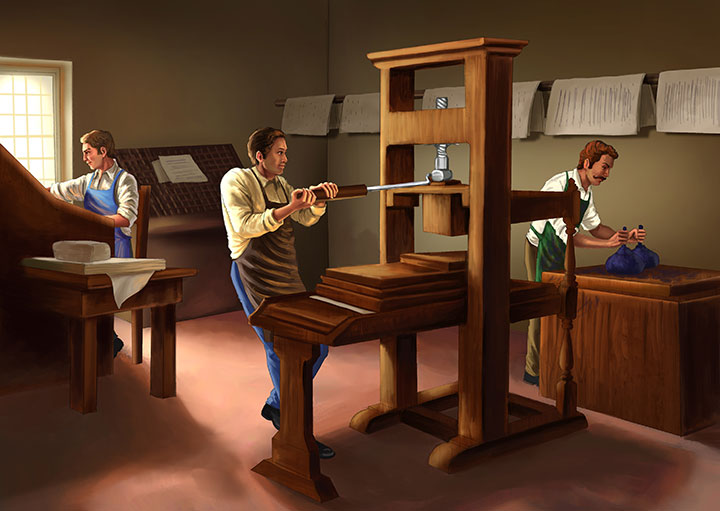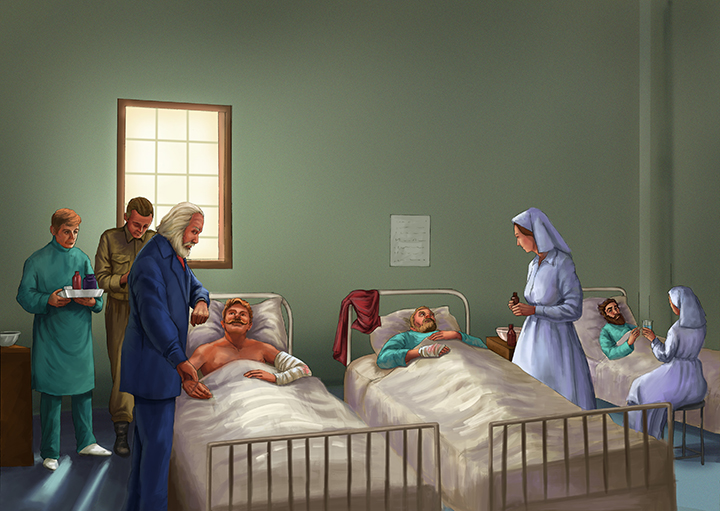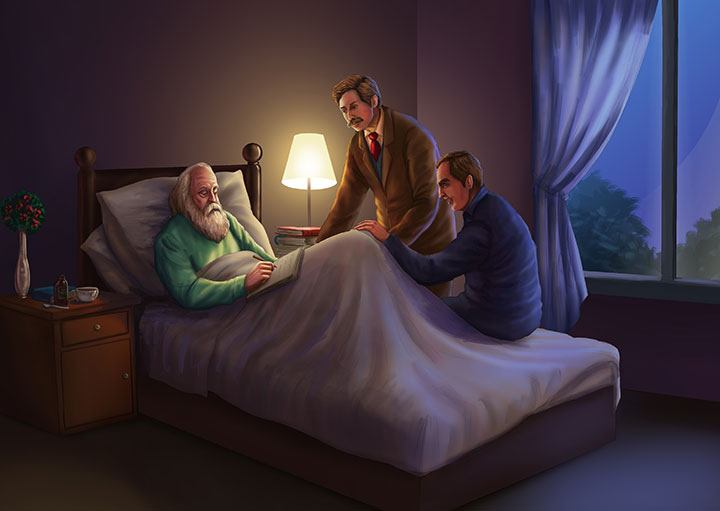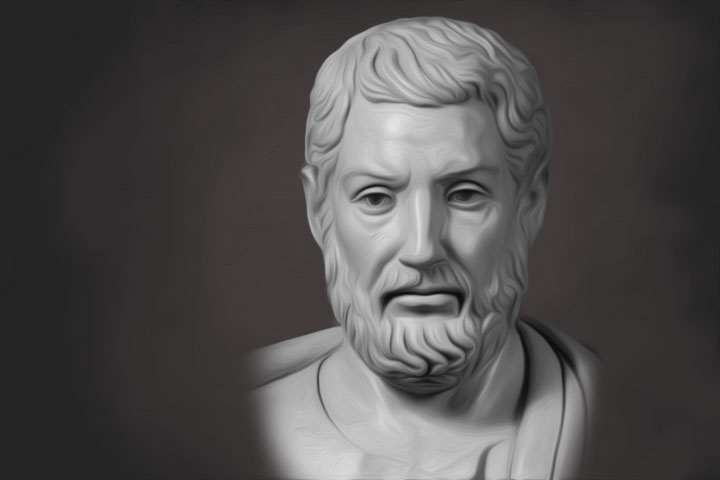
“Keep your face always toward the sunshine - and the shadows will fall behind you.”
These beautiful words were penned by Walt Whitman, one of America’s most influential poets. Just as the sunflower turns toward the sun, and blooms with all its glory; just as one candle is enough to brighten up a room plunged in total darkness; one must happily celebrate the beauty in life, rather than mope in the shadows cast by darkness.
Author, poet, philosopher and journalist Walt Whitman, remembered more for his landmark collection of poems Leaves of Grass, aimed to express the American spirit and its democracy, through his unique form of poetry. Whitman rose from the depths of obscurity to become a national figure, and was called the “Bard of Democracy”.
Let us have a look at the life he coursed through, to have created such an eternal impact on our mindscape.

Walter Whitman and Louisa Van Velsor lived in West Hills, a pretty hamlet in the Huntington Township of Suffolk County, Long Island, New York. Walter Whitman was a house-builder of moderate means. His father, besides being a speculator in real estate, worked as a farmer and a carpenter, in order to supplement the family income.
Walt Whitman was born on 31 May, 1819, the second child of Walter Whitman and Louisa Van Velsor. Walt’s other siblings were Jesse, Mary Elizabeth, Hannah Louisa, an infant who lived for just a few months, Andrew Jackson, George Washington, Thomas Jefferson and Edward, who was physically and mentally challenged. Walt’s parents were true patriots and loved their country very much. That was why they named some of their sons after American heroes.

Walt was brought up in a country home and hence his surroundings were very picturesque, with bays and beaches around. In summer, he would go to collect sea-gulls’ eggs and in winter, he would go fishing. Walt loved to go boating and riding, and walk barefoot on the sea-beach. He spent many happy childhood days here.
When Walt was four years old in 1823, his family shifted to Brooklyn in New York. New York was a land of opportunity, and his father thought to make his business successful there. He expected a boom in real estate, and built house after house for himself. Unfortunately, the success he so desired was elusive. He mortgaged and eventually lost each of his properties.
Between 1825 and 1830, he frequently relocated with his family, within the city. Walt was put in a public school in Brooklyn till the age of 11, and he studied there during these years.

Walt’s father found it increasingly difficult to sustain his large family’s needs with only his meagre earnings. He decided to put a stop to Walt’s schooling. So right from the age of 11, little Walt started working.
At first he worked for some time as an office boy in a lawyer’s office. At work, he had a neat desk and a window corner. His employer helped him to improve his handwriting and composition. What was more; he even paid to get Walt a subscription to a big circulating library. That was quite a turning point for the young lad. It was as if the books proffered him the world, opening wide unexplored vistas in knowledge. Walt enjoyed reading; he read up all the volumes of the Arabian Nights and indulged in reading all kinds of romantic novels. He took to Walter Scott’s writing and one by one, read all his novels, even his poetry. Then he worked under a doctor for some time as his assistant.

In the meantime, perhaps to drown his woes, his father got used to consuming alcohol. He became addicted to it and was also drawn to conspiracy-driven politics.

In the summer of 1832, at the age of 13, Walt started working at Worthington’s printing house. In 1833, his family moved back to the country life of Long Island. There he started working as a printer’s apprentice, in the office of the weekly paper, the Long Island Patriot. It had a very limited circulation and was hand-printed on a wooden press. Around 1835, he also worked for the Long Island Star newspaper as a compositor.
The beauty and meaning of the written words had a deep impact on him. He was a voracious reader and read the Bible, Dante, Homer and Shakespeare. About this time, he also took to writing poetry…some emotional pieces were published in the Patriot, and in the celebrated Mirror of New York City.
Walt then worked as a printer in New York. But one day, on 12 August 1836, there was a huge fire which spread in the printing district. It was so devastating that the entire industry was almost destroyed. The fire also destroyed his dreams of continuing as a printer. He now had to decide on the best possible course of action for his sustenance.

He was just 17. Various options lay before him. He considered them and realized that teaching was something he liked. He decided to make good use of whatever little educational background he had and his observation of the teachers, who had taught him. Also, he had a love for reading and writing and had training as a compositor. So in 1836, he started his career as a school teacher. He taught in one of the single room school houses in Long Island, for a period of almost 5 years. He was quite adept at teaching, and had a kind disposition towards his students.
In the midst of his teaching career, he turned his attention to journalism. In 1838, he founded the Long-Islander, a weekly newspaper, in his own town of Huntington. He ran his business with some help, but did the work of printing and most other work himself.

Every week, he would go round the country and deliver his papers on horseback. The rides through the countryside with the hayfields dotting the landscape, the hospitality of the farmers and their wives and the smell of the woods, refreshed and rejuvenated him.
Between 1839 and 1840, he returned to his teaching career and taught at Babylon, Jamaica Academy and a few other places. Self-expression was now playing a vital role in his life. He was already into teaching and writing, and now, he was also a keen participant as a debater in several local societies, and a public speaker on political issues. In 1840, he even campaigned for Van Buren, the Democratic nominee.
In 1841, he became a compositor for New World, and then was editor of the Aurora and the Tattler newspapers for some months. Later, he also reported and edited for some of the Brooklyn and New York City newspapers. He also sent in his contributions to the American Review, the Broadway Journal, and other periodicals. Some of his short stories like Death in the School Room and Wild Frank’s Return were published in 1841 in the Democratic Review, which was then the then leading literary publication in the United States. He also published a short novel, Franklin Evans or the Inebriate, which was released on 23 November, 1842, as a paper quarto of thirty-four pages, along with the New World. The publishers announced it as “written with a view to aid the great work of reform, and rescue young men from the demon of intemperance.” Twenty thousand copies were sold at the rate of ten copies for a dollar, and Walt gained a moderate sum.

As an editor, Walt was highly opinionated and had a volatile temperament. This many a times led to differences with his bosses, as well as his readers. He backed supposedly radical positions on immigration, labour issues and women’s property rights. He was not afraid to go after other newspaper editors. Due to his attitude, whichever job Walt held, was cut short, and he was ousted. This made him hop from one newspaper office to another and in a period of four years, he had changed his workplace almost seven times.
At the age of 27 in 1846, he became the editor of the Brooklyn Daily Eagle, a prominent newspaper. At that time, he lived with his parents in Brooklyn. This was when the entire country was embroiled in the debate over slavery. Having personally been a witness to the viciousness of slavery, Walt took to the issue in anger. He was disturbed and disheartened, thinking about the effect of slavery on the future of America and its democracy. He put forward his views on slavery and free soil, clearly in his paper. This did not go down well with some well-connected readers, and the owners of the paper. In the initial months of 1848, he resigned from this paper.
During this period, he thought it prudent to make notes of his observations in a small handy notebook. In this, he wrote down his views in a poetical way, that could weave a cord of peace among dissenting groups in the country.
After resigning from the Daily Eagle, Walt was again without work. One evening, as he was walking along in the lobby of the old Broadway Theatre, a Southern gentleman met him and gave him the opportunity to join his newspaper staff in New Orleans. Walt accepted it, and so left New York and joined as editor of the Crescent, a New Orleans newspaper. His brother, Jeff, who was 15 years old, also accompanied him there, and worked in the printer’s office. In the first issue of the `Crescent’ which was published on 6th March, 1848, Whitman wrote his piece titled, `Sailing the Mississippi at Midnight’. However, his stint as editor at the ‘Crescent’ newspaper was short and lasted just three months.
His brother Jeff felt homesick, and they decided to return to their family in Brooklyn that very same year. Initially, Walt ran a small bookstore and a printing-office. He founded the Freeman, a weekly free-soil newspaper. However, within a year he had to give it up. Walt then assisted his father in his building and carpentry business. In his spare time, he continued reading voraciously, enriching his intellectual acumen and put his mind to creative use through poetry.
His father’s health kept deteriorating and he passed away in early 1855. Walt who was till then assisting him in the work of carpenter and builder, brought this work to an abrupt halt.

The strokes from his pen brought about a collection of twelve poems and a preface in prose. His own style and voice came through in it; a voice that spoke to the reader directly, in the `I’ first person. This was, in itself, a radical departure from the traditional rhyme and meter which, as established poetic norms, was prevalent then.
The poems were untitled and Walt self-published the volume in the spring of 1855. It contained ninety-five pages. He titled the collective volume Leaves of Grass and took out a copyright on its first edition. The cover of the volume featured a bearded Walt; however the author’s name was not given. At that time, he could manage to print only 795 copies of the book. Some of his major poems were, “I Sing the Body Electric”, “The Sleepers”, and “Song of Myself”. These songs were `merged’ with the others, and had the singular title “Leaves of Grass”. However, the differentiation of the poems was shown with clear breaks in the text and by repeating the title after every poem.
The book proved to be a commercial failure; the odd form, the novel kind of poetry and an unknown poet; all proved to be its undoing. Critics and men of letters were hostile towards the book, which had prominent sensuous and sexual imagery, in an America which was then puritanical.
In July 1855, Walt sent a copy of the book to fellow poet, essayist and lecturer Ralph Waldo Emerson. Emerson wrote to Walt praising the collection wholeheartedly as “the most extraordinary piece of wit and wisdom” from an American poet. Others like critic Edward Everett Hale in the North American Review and W. J. Stillman in the Crayon, wrote positively about the book.
But dismayed at the overall reaction to the book, Whitman went off to the east end of Long Island and Peconic Bay. Hours and days of contemplation later, he came back to New York with a steeled resolve, “to go on with my poetic enterprise in my own way and finish it as well as I could.”

In June 1856, a second edition of the book was published with additional poems, original in form and richer in substance. It contained about 400 pages and had thirty-three poems in all. Walt had even altered the earlier published poems, and diminished the egoistical `I’ to a more altruistic theme, pitching for the American workman and democracy.
This edition contained the letter of praise for the first edition from Emerson, with a favourable review by him. It also contained Whitman’s long open response to Emerson’s letter. The edition also included a new piece, “Sun-down Poem” which was later renamed as “Crossing Brooklyn Ferry”. Emerson was awestruck by Whitman’s poetry, for he was after all, a newcomer on this front.
However, the second version, like its earlier counterpart did not do so well commercially. The press condemned it like before. Public disapproval grew, and the book went out of print. Yet men of discerning judgment began noticing Walt. In the years that followed, Walt immersed himself in his work, living simply. At one time, he even wished to reach out to his countrymen through lectures, but his plans fell through.
Walt’s family life in Brooklyn had, by now, become dysfunctional. His sister and one of his brothers were mentally challenged, and another of his brothers named Andrew was an alcoholic. Walt resided in the attic of the house and shared his bed with his mentally handicapped brother.

Later, Walt travelled to Boston and had a discussion with R. W. Emerson before bringing out the third edition. It was released in 1860 by Thayer and Eldridge, a Boston firm. It was a substantial volume and had 124 new poems. Walt made a number of new friends in Boston; among them the publisher Mr. Eldridge and a brilliant young Irish novelist named W. D. O’Connor. Sometime in June 1860, he returned from Boston, and led a simple and quiet life at his mother’s house.
It was at this time in April 1861, that the Civil War broke out. The publishing house by this time, had sold some four to five thousand copies after which it downed its shutters due to this political crisis.
Walt, now 42, suffered financially. The Civil War shook him up personally, too. It was at this time that he vowed to live in a “purged, cleansed, spiritualized, invigorated body.” He worked as a freelance journalist, and this gave him the opportunity to visit and listen to the woes of the wounded people, in the New York hospitals. In December 1862, his brother George, who fought for the Union was also wounded at Fredericksburg. So, Walt moved to Washington to take care of his wounded brother.

The American Civil War (1861-64) was a major event – a critical turning point in Walt’s life. The war caused large-scale destruction of lives, and there were about 50,000 wounded and sick people in Washington itself. A visit to a hospital can change most people, even hardened ones. The helplessness of the bed-ridden, the physically challenged and their mental anguish…Walt was overcome by the sight of the war-wounded and decided to assist at the hospitals in Washington. He stayed on in Washington for eleven years. His voluntary work made him a philosophical caretaker. He not only dressed the physical wounds of the wounded, but also addressed their emotional, psychological and spiritual wounds.

Walt estimated that he must have made almost 600 hospitals visits, attended to around 100,000 patients, and spent thousands of dollars. To support himself and his hospital work, he freelanced for newspapers and found part-time work in the office of Major Hapgood, an army paymaster. Besides, his friends also supported him monetarily. Walt always felt that the positive humanitarian feelings of love and friendship, lit the dark world of the sick and wounded, and aided their recovery much more than tons of medicine. He would go through wards carrying his capacious haversack, which had everything ranging from biscuits, comfits and fruits to pen, paper and postage stamps; anything that a patient might need. Not only that, he had a kind word, a warm hug, a gentle kiss and words of cheer for the distressed and depressed lot. His kindly intervention also saved a man’s leg from amputation.
During this time, Walt lived frugally in a little room in a lodging-house, near to the O’Connors, his good friends. Slowly, his health started to suffer and once he got an infection through a cut in his hand, and at another time, he even contracted malaria. Add to that, his social work in caring for the wounded, insufficient rest, combined with the after effects of seeing human suffering in such large numbers; all took their toll on him. So he went back to Brooklyn for some well-needed rest.
The life-altering visits to the hospital caused him to take recourse to poetry. The misery of the unfortunate wounded raised his sensitiveness, which in turn made his imagination soar. Walt self-published a new collection of poems titled Drum-Taps, in 1865. It included the poems, Beat! Beat! Drums! and Vigil Strange I Kept on the Field One Night.
On 14th April, 1865, Abraham Lincoln, the 16th president of the United States, was assassinated. Deeply affected by the turn of events, Walt composed an elegy for President Abraham Lincoln ‘When Lilacs Last in the Dooryard Bloomed’ and ‘O Captain! My Captain!’. These and other verses were released as a supplementary volume, ‘Sequel to Drum-Taps’.
In February 1865, Walt applied for and was assigned a clerical post in the Indian Bureau of the Department of Interior. Unfortunately, James Harlan, the prevalent Secretary of the Interior, found out that the author of ‘Leaves of Grass’, which he had found offensive, was none other than the clerk in his office, Walt. The poet’s services were terminated the following June. Later when Mr. J. H. Ashton, the assistant U. S. attorney at the time, failed to make Harlan understand, he promptly appointed Walt as a clerk in his own department.
In, and after the year 1866, Walt’s poems received more appreciation in America and abroad. In 1867, the fourth edition of Leaves of Grass was published. It was a heavily revised one, and was hence called the “workshop” edition. Eight new poems were included in it. It received favourable reviews in Germany and England, and the younger men of letters like Dowden, Symonds and W. M. Rosetti, were impressed by Walt’s poetry.

Walt’s life was a struggle. In Washington, he supported himself with his clerk’s salary and from the modest royalties earned from his works. Anything in excess, received from his friends and well-wishers, would be spent on the needs of the patients that he nursed. Moreover, he also had to offer monetary assistance to his widowed mother and invalid brother. As a result of this, many writers from England and America assisted him monetarily.
Walt endeared himself to everyone and forged many friendships in his life. Even after the Civil War, he used to visit wounded veterans. It was about this time that he also became acquainted with Peter Doyle, a young Confederate soldier and street-car conductor. Theirs was a very intimate and enduring relationship; that of a father and son.
In 1871, the fifth edition of Leaves of Grass was published with democracy as its central theme, and this included some marvellous poems, around the Passage to India. In the same year, he published Democratic Vistas, a prose pamphlet comprising three essays, outlining the role of democracy in creating a new America.

In January 1873, his life took a dramatic turn for the worse. Walt suffered a mild paralytic stroke. In the May of that year, his aged mother became seriously ill. She was staying with his brother George at Camden, New Jersey. So Whitman went to Camden to see his mother. She was happy and relieved to see her son had made time to come and see her and three days later, she quietly passed away. They had shared a strong bond, and Whitman was stricken with grief after her death.
As his movements became restricted due to his semi-invalid state, he settled down at his brother’s Camden home. He was 54 then and was looked after by his relatives. He kept his spirits up by writing letters to Peter Doyle, during this miserable period of his life.
In 1876, the sixth edition of Leaves of Grass was published in two volumes, and sold at five dollars each. The companion volume was Two Rivulets, containing Democratic Vistas, a new prose titled Memoranda of the War, and other new poems. His friends bought these volumes voluntarily, sometimes at double the price, thereby easing his financial difficulties.
In the spring of 1876, Walt felt much better health wise. So he left Camden and went to stay with his friend George Stafford, at their old farm-house in the village of Whitehorse. He enjoyed walking in the natural surroundings. He later returned the following summer, but visited the Stafford residence almost every year after this. In 1879, he also travelled to St. Louis to visit his brother, Jefferson, and spent some months with him.
In 1881, Walt visited Boston and brought out the seventh edition of Leaves of Grass. The seventh edition is the widely accepted one today, although the eighth and ninth editions are as important. In 1882, Specimen Days and Collect was published. It was composed from the notes and sketches that he wrote after the Civil War.

In the meantime, Walt kept working on the definitive edition of Leaves of Grass. It was again published in 1882, by a reputed publishing firm, James R. Osgood and Company. Two thousand copies were sold, and this helped Walt to earn a considerable sum of money, and publicity. But later, complaints poured in and the publishers stopped publishing it.
In the year 1884, Walt bought a modest home, on Mickle Street in Camden, New Jersey. It was a simple, two-story cottage and cost him two thousand dollars. Walt paid for most of it through his own earnings, and a generous merchant from Philadelphia lent him the remainder. In 1885, Walt suffered mild sunstroke, which confined him to his home. His dear friends bought him an easy-riding buggy and a good horse, which both delighted and helped Walt in moving around. He had an elderly couple who served as his housekeepers, and later Mrs. Mary Davis, a widow, served him till the end of his life. Walt managed himself with the irregular royalties from his books and with some monetary assistance from his friends.
On his 70th birthday in the year 1888, a pocket-size edition of Leaves of Grass was published. In June, Walt had a paralytic attack which temporarily made him lose his power of speech. He, however, recovered a little and through his sheer will power, published November Boughs, containing many new poems and some prose. In 1889, he became an invalid, and was dependent on his nurse for moving around.

Walt spent the later years of his life in his Camden house. Two of his friends, Horace Traubel and Thomas B. Harried, gave him company and attended to his needs. It was here in 1891-92 that he mulled over the additions and revisions to a new edition of his book. It is called the “deathbed” edition, since it was the last in his lifetime. In 1891, he also worked on his final volume of poems, Good-Bye, My Fancy!

Walt’s health continued to deteriorate. He designed, and had built a large gray granite tomb that year in Camden’s Harleigh Cemetery. The ashes of his mother and father were transported there. On 17th December, 1891, he unfortunately contracted pneumonia too. His life force pulled him on for another three months before it gave out on 26th March, 1892.

Walt Whitman is immortal in American literature. He had an impressive character, and an imposing personality, standing six feet tall and weighing nearly 200 pounds, with snow-white hair and beard, which was long and very fine. He sparked a new attitude towards literature with his novel theory of composition. He loved solitude, for the bliss of communion with nature that it gave him, and his meditative practices stimulated his genius even more. He enjoyed reading classic literature in his leisure hours. He also loved the companionship of all classes of people, especially the working middle class. He loved the forms of art like oratory, drama and the opera; and these left a deep impression upon him. He had simple daily habits, and remained unmarried throughout his life.
Yet he was very much a paradoxical human being, subject to extremes in nature. It was perhaps with time that his animalistic tendencies were tempered, and he was spiritually transformed. This gave him a mystic outlook, with the sense of awakened cosmic consciousness of oneness and love. This broadened outlook added charm and magnetism to his personality, which increased his aura.

Walt’s Leaves of Grass - the work of his life; went through several editions during his lifetime. This was because he continued to refine the volume throughout his career.

Perhaps these poems do symbolically reflect his life and that of the world around him. It is perhaps, his childhood impressions, which are reflected in his poems, `There was a Child went Forth’, `Out of the Cradle endlessly Rocking’, and in `Specimen Days’. Whatever it is, Walt had opined that “This is no book, who touches this touches a man.”
His life found the fullest of expression in poetry, in the enviable and enthralling collection that is Leaves of Grass. The American spirit comes through in it, for he had an in-depth knowledge of the life in America and its countrymen. The distinguishing element of his writing was his form of spontaneous self-expression. His poetry of democracy arose from the depths of his contemplative emotions.
Work, whatever it is, is to be done with perfection and enthusiasm. No work is small in comparison to another; each piece of work contributes to complete the perfect whole…and this is probably what this evergreen and outstanding poet of American literature meant by his beautiful quote,
“I believe a leaf of grass is no less than the journey-work of the stars.”
Next Biography











